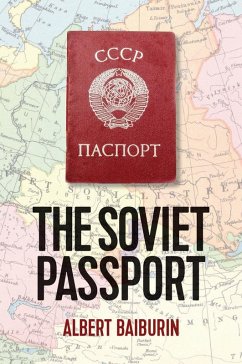In this remarkable book, Albert Baiburin provides the first in-depth study of the development and uses of the passport, or state identity card, in the former Soviet Union. First introduced in 1932, the Soviet passport took on an exceptional range of functions, extending not just to the regulation of movement and control of migrancy but also to the constitution of subjectivity and of social hierarchies based on place of residence, family background, and ethnic origin.
While the basic role of the Soviet passport was to certify a person's identity, it assumed a far greater significance in Soviet life. Without it, a person literally 'disappeared' from society. It was impossible to find employment or carry out everyday activities like picking up a parcel from the post office; a person could not marry or even officially die without a passport. It was absolutely essential on virtually every occasion when an individual had contact with officialdom because it was always necessary to prove that the individual was the person whom they claimed to be. And since the passport included an indication of the holder's ethnic identity, individuals found themselves accorded a certain rank in a new hierarchy of nationalities where some ethnic categories were 'normal' and others were stigmatized. Passport systems were used by state officials for the deportation of entire population categories - the so-called 'former people', those from the pre-revolutionary elite, and the relations of 'enemies of the people'. But at the same time, passport ownership became the signifier of an acceptable social existence, and the passport itself - the information it contained, the photographs and signatures - became part of the life experience and self-perception of those who possessed it.
This meticulously researched and highly original book will be of great interest to students and scholars of Russia and the Soviet Union and to anyone interested in the shaping of identity in the modern world.
Hinweis: Dieser Artikel kann nur an eine deutsche Lieferadresse ausgeliefert werden.
While the basic role of the Soviet passport was to certify a person's identity, it assumed a far greater significance in Soviet life. Without it, a person literally 'disappeared' from society. It was impossible to find employment or carry out everyday activities like picking up a parcel from the post office; a person could not marry or even officially die without a passport. It was absolutely essential on virtually every occasion when an individual had contact with officialdom because it was always necessary to prove that the individual was the person whom they claimed to be. And since the passport included an indication of the holder's ethnic identity, individuals found themselves accorded a certain rank in a new hierarchy of nationalities where some ethnic categories were 'normal' and others were stigmatized. Passport systems were used by state officials for the deportation of entire population categories - the so-called 'former people', those from the pre-revolutionary elite, and the relations of 'enemies of the people'. But at the same time, passport ownership became the signifier of an acceptable social existence, and the passport itself - the information it contained, the photographs and signatures - became part of the life experience and self-perception of those who possessed it.
This meticulously researched and highly original book will be of great interest to students and scholars of Russia and the Soviet Union and to anyone interested in the shaping of identity in the modern world.
Hinweis: Dieser Artikel kann nur an eine deutsche Lieferadresse ausgeliefert werden.
"The Soviet passport's antiphonal role, as both technique of oppressive state control and as a positive sign of equal rights and status for citizens, gave it extraordinary importance in everyday life and made it a quasi-sacred object. Thoroughly researched, vividly written and moving, this book is essential reading for an understanding of changing citizenship regimes in Russia."
Caroline Humphrey, University of Cambridge
"In this meticulously researched and powerfully argued book, Albert Baiburin mines the history of the Soviet passport as both an instrument of social engineering and control and a totem of individual experience and cultural creativity. The result is an innovative and fascinating account of the Soviet experiment."
Daniel Beer, Royal Holloway, University of London
"For Soviet citizens, the passport was a crucial possession that both enabled and restricted them. Albert Baiburin's exhaustive and lively account, fluently translated by Stephen Dalziel, shows why passports were so central to the maintenance of the party dictatorship."
Robert Service, University of Oxford
"significantly advances our understanding of a crucial institution of Soviet governance"
H-Soz-Kult
"scintillating, panoramic history-cum-ethnography of the Soviet passport. Filled with surprising insights and details, it now appears in Stephen Dalziel's superb and lavishly illustrated translation."
Times Literary Supplement
"thoughtful, deeply researched and fluently translated"
History Today
Caroline Humphrey, University of Cambridge
"In this meticulously researched and powerfully argued book, Albert Baiburin mines the history of the Soviet passport as both an instrument of social engineering and control and a totem of individual experience and cultural creativity. The result is an innovative and fascinating account of the Soviet experiment."
Daniel Beer, Royal Holloway, University of London
"For Soviet citizens, the passport was a crucial possession that both enabled and restricted them. Albert Baiburin's exhaustive and lively account, fluently translated by Stephen Dalziel, shows why passports were so central to the maintenance of the party dictatorship."
Robert Service, University of Oxford
"significantly advances our understanding of a crucial institution of Soviet governance"
H-Soz-Kult
"scintillating, panoramic history-cum-ethnography of the Soviet passport. Filled with surprising insights and details, it now appears in Stephen Dalziel's superb and lavishly illustrated translation."
Times Literary Supplement
"thoughtful, deeply researched and fluently translated"
History Today








